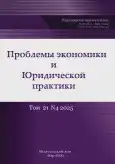Legislative bodies of the subjects of the Russian Federation at the current stage of reform of the united system of public power
- Authors: Abgarov S.S.1, Avanesova A.A.1
-
Affiliations:
- North Caucasus Federal University
- Issue: Vol 21, No 4 (2025)
- Pages: 29-34
- Section: Public Law (State and Legal Sciences)
- URL: https://journal-vniispk.ru/2541-8025/article/view/316445
- EDN: https://elibrary.ru/RSWGOW
- ID: 316445
Cite item
Abstract
Changes in the constitutional and legal system of Russia after the 2020 reform have made it necessary to assess the status of legislative bodies of the constituent entities of the Federation. These institutions are formally enshrined in the public authority system as bodies of popular representation, but their practical activities demonstrate significant differences between regions and reveal imbalances in the implementation of the principle of separation of powers. The study is based on the analysis of federal legislation, acts of constituent entities, and parliamentary regulations, which helps identify key trends and problem areas. The purpose of the work is to determine how modern constitutional modernization affects the normative consolidation of the powers of parliaments of constituent entities of the Russian Federation and how fully they are able to perform control and representation functions. The focus is on the differences in the legal registration of powers, the degree of detail of procedures, as well as the practice of their implementation at the regional level. The results of the study show that many constituent entities continue to rely excessively on regulations, while regional laws on the status of parliaments are absent or do not provide sufficient legal certainty. This creates risks for the stability of the system of checks and balances and weakens the role of legislative bodies in the structure of public authority. A conclusion was made on the advisability of unifying key provisions of the legislation of the subjects, formulating a mandatory list of powers of parliaments and developing uniform standards for their legal status, which will improve the efficiency and predictability of their activities.
Full Text
##article.viewOnOriginalSite##About the authors
Stepan S. Abgarov
North Caucasus Federal University
Author for correspondence.
Email: abgarovctepan@rambler.ru
Cand. Sci. (Law), Associate Professor of the Department of Constitutional and International Law
Russian Federation, StavropolAnna A. Avanesova
North Caucasus Federal University
Email: annavanesova@yandex.ru
ORCID iD: 0000-0003-2472-9616
SPIN-code: 5712-1419
Cand. Sci. (Law), Associate Professor of the Department of Constitutional and International Law
Russian Federation, StavropolReferences
- Bezrukov A.V. Russian federalism and local self-government: Trends in the relationship and development prospects. State and Law. 2023. No. 12. Pp. 23–36. (In Rus.)
- Dobrynin N.M. Russian federalism as a preimage of the future global multi-polarity. Russian Journal of Management and Socio-Economic Research. 2024. No. 2. Pp. 15–27. (In Rus.). doi: 10.31857/S1026945224020037.
- Romashova I.V. Constitutional legal understanding as a systemic element of Russian federalism. Constitutional and Municipal Law. 2024. No. 4. Pp. 17–28. (In Rus.)
- Semenov I.A. Federal territory: Constitutional and legal regulation. Constitutional and Municipal Law. 2024. No. 6. Pp. 42–55. (In Rus.)
- Tkhabisimova L.A., Gatsolaeva A.Kh., Tsapko M.I. Constitutional and legal regulation of democracy in the constituent entities of the Russian Federation: Modern trends. Moscow: Limited Liability Company «Prospect», 2021. 128 p.
- Bochkareva E., Kurdyuk P., Chueva A., Voronenko E. First federal territory in Russia: Features of public authority organization. Revista Relações Internacionais no Mundo Atual. 2024. Vol. 2. No. 44. Pp. 413–424.
- Keshikova N., Demeshko I. The concept and structure of activities in the field of organizing and holding elections to government bodies in the theory of constitutional law. Cuestiones Políticas. 2021. Vol. 39. No. 71. Pp. 682–702. doi: 10.46398/cuestpol.3971.41.
Supplementary files








